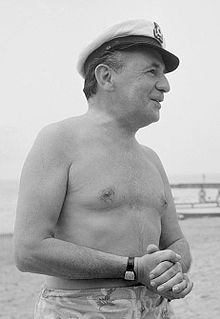Léonide Moguy
Léonide Moguy , actually Leonid Mogilewski ( Russian Леонид Могилевский ) (born July 14, 1898 in Saint Petersburg , Russian Empire , † April 20, 1976 in Paris , France ) was a Russian-French editor and film director .
Live and act
In the Soviet Union
Moguy had studied law , political economy and psychology . While still in the Soviet Union, he made his first contacts with film. He started as a film critic, then joined the Ukrainian Film Council and in 1923 organized an experimental film workshop in Moscow based on the psychological principles of Binet and Washburne. Then Moguy became assistant to the film producer Joseph Ermolieff . During this time Moguy also made a number of documentaries, including one about Leo Tolstoy . In 1927 he took over the management of a film test laboratory. The following year he moved to Paris to take over the processing of Soviet films for the French market.
In the West
With the dawn of the talky-about-film era, Moguy was brought in to edit his films before, after an assistant director in 1935 (“Baccara”) , he was allowed to direct his first own film the following year. His directorial debut, Unrest in the Girls' Boarding School , was a great success with the public. Until the outbreak of war in 1939, Moguy turned mainly dramatic and melodramatic material before the Jew narrowly escaped the occupation of France by the Wehrmacht and emigrated to the United States via Lisbon . In Hollywood, Moguy found employment as a B-film director and shot “Paris After Dark” in 1943, an anti-Nazi propaganda piece about the occupied French capital. The next work, “Action in Arabia”, also combined elements of adventure film with anti-Nazi propaganda. In 1945 he enabled Ava Gardner to play her first substantial leading role in "Whistle Stop" .
Shortly after the end of the war, Léonide Moguy returned home to France and in the following years shot pure mass entertainment without any artistic claim, but sometimes with highly speculative approaches. In Italy , at the beginning of the 1950s, he brought out the young Italian artist Pier Angeli with the two tender love and initiation stories "Tomorrow is too late" and "Tomorrow is another day" and thus paved her way to Hollywood in 1950 ( Fred Zinnemanns Teresa ). With the end of his directorial activity - his farewell work "Les hommes veulent vivre" in 1961 thematized the fear of a nuclear war - Léonide Moguy took over the management of the cinematographic department of the Red Cross .
Trivia
In 2012, the cineast Quentin Tarantino paid homage to his colleague by naming one of his characters in Django Unchained .
Filmography
- as an editor
- 1932: La Merveilleuse Journée
- 1933: Charlemagne
- 1933: Théodore et Cie
- 1934: Le Scandale
- 1934: Le Comte Obligado
- 1935: Divine
- 1935: Baccarat
- as a feature film director (complete)
- 1936: Unrest in the girls' boarding school / being a father - on the other hand very much (Le Mioche)
- 1938: Prison sans barreaux (also screenplay)
- 1938: Conflit
- 1939: Le Deserteur / Je t'attendrai
- 1939: Wisps of the border (L'Empreinte du dieu)
- 1943: Paris After Dark
- 1944: Action in Arabia
- 1946: Whistle Stop
- 1947: The Foreign Legion fortress (Bethsabée)
- 1949: Tomorrow is too late (Domani é troppo tardi)
- 1950: Tomorrow is another day (Domani é un altro giorno)
- 1953: Children of Love (Les Enfants de l'amour)
- 1956: In the swamp of Paris (Le Long des Trottoirs)
- 1957: Girl trap (Donnez-moi ma chance)
- 1961: Les hommes veulent vivre
Individual evidence
Web links
- Léonide Moguy in the Internet Movie Database (English)
- Biography on cinema.encyclopedie
- Biography on cineartistes.com
| personal data | |
|---|---|
| SURNAME | Moguy, Leonide |
| ALTERNATIVE NAMES | Mogilewski, Leonid (real name); Могилевский, Леонид (Russian) |
| BRIEF DESCRIPTION | Russian-French editor and film director |
| DATE OF BIRTH | July 14, 1898 |
| PLACE OF BIRTH | Saint Petersburg , Russian Empire |
| DATE OF DEATH | April 20, 1976 |
| Place of death | Paris , France |
